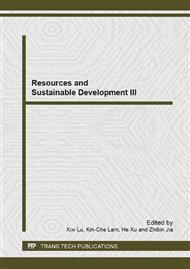p.2046
p.2051
p.2055
p.2061
p.2067
p.2072
p.2076
p.2080
p.2084
Study on Extended Producer Responsibility
Abstract:
Extended Producer Responsibility Policy is an environmental policy firstly implemented in OECD countries. The policy enables the producers to extend responsibility for the products to the waste disposal stage of the life cycle after consumption. The EPR policy of OECD countries is functioned on the products sold in these countries and the producers. As OECD countries are the main exporting market of Chinese business, some of them will certainly be influenced by the policy. As China’s environmental problems have become crucial, we needs to learn from the experience of OECD countries, and enable the producers to bear the waste disposal cost to reduce consumer waste emissions.
Info:
Periodical:
Pages:
2067-2071
Citation:
Online since:
June 2014
Authors:
Price:
Сopyright:
© 2014 Trans Tech Publications Ltd. All Rights Reserved
Share:
Citation:


